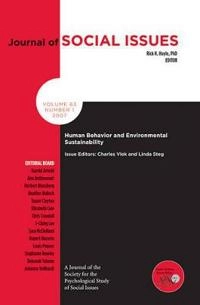

Human Behavior and Environmental SustainabilityUpplaga 1
- Upplaga: 1a upplagan
- Utgiven: 2007
- ISBN: 9781405175487
- Sidor: 220 st
- Förlag: John Wiley & Sons
- Format: Häftad
- Språk: Engelska
Om boken
Åtkomstkoder och digitalt tilläggsmaterial garanteras inte med begagnade böcker
Mer om Human Behavior and Environmental Sustainability (2007)
I mars 2007 släpptes boken Human Behavior and Environmental Sustainability skriven av Charles Vlek, L. Steg. Det är den 1a upplagan av kursboken. Den är skriven på engelska och består av 220 sidor. Förlaget bakom boken är John Wiley & Sons som har sitt säte i Hoboken.
Köp boken Human Behavior and Environmental Sustainability på Studentapan och spara pengar.
Referera till Human Behavior and Environmental Sustainability (Upplaga 1)
Harvard
Oxford
APA
Vancouver



















